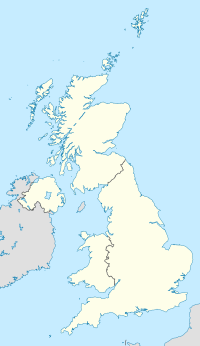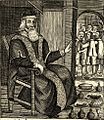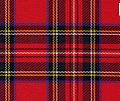Portal:United Kingdom
The United Kingdom Portal
 |
 |

| |
The United Kingdom of Great Britain and Northern Ireland, commonly known as the United Kingdom (UK) or Britain, is a country in Northwestern Europe, off the coast of the continental mainland. It comprises England, Scotland, Wales, and Northern Ireland. The UK includes the island of Great Britain, the north-eastern part of the island of Ireland, and most of the smaller islands within the British Isles, making up a total area of 94,354 square miles (244,376 km2). Northern Ireland shares a land border with the Republic of Ireland; otherwise, the United Kingdom is surrounded by the Atlantic Ocean, the North Sea, the English Channel, the Celtic Sea, and the Irish Sea. The United Kingdom had an estimated population of over 68.2 million people in 2023. The capital and largest city of both England and the United Kingdom is London, whose wider metropolitan area is the largest in Western Europe, with a population of 14.9 million. The cities of Edinburgh, Cardiff, and Belfast are the national capitals of Scotland, Wales, and Northern Ireland, respectively.
The lands of the UK have been inhabited continuously since the Neolithic. In AD 43, the Roman conquest of Britain began; the Roman departure was followed by Anglo-Saxon settlement. In 1066, the Normans conquered England. With the end of the Wars of the Roses, the English state stabilised and began to grow in power, resulting by the 16th century in the annexation of Wales, the domination of Scotland, and the establishment of the British Empire. Over the course of the 17th century, the role of the British monarchy was reduced, particularly as a result of the English Civil War. In 1707, the Kingdom of England and the Kingdom of Scotland united under the Treaty of Union to create the Kingdom of Great Britain. The Acts of Union 1800 incorporated the Kingdom of Ireland to create the United Kingdom of Great Britain and Ireland in 1801. Most of Ireland seceded from the UK in 1922 as the Irish Free State, and the Royal and Parliamentary Titles Act 1927 created the present United Kingdom.
The UK became the first industrialised country and was the world's foremost power for the majority of the 19th and early 20th centuries, particularly during the "Pax Britannica" between 1815 and 1914. The British Empire was the leading economic power for most of the 19th century, a position supported by its agricultural prosperity, its role as a dominant trading nation, a massive industrial capacity, significant technological achievements, and the rise of 19th-century London as the world's principal financial centre. At its height in the 1920s, the British Empire encompassed almost a quarter of the world's landmass and population, and was the largest empire in history. However, its involvement in the First World War and the Second World War damaged Britain's economic power and a global wave of decolonisation led to the independence of most British colonies. (Full article...)
Featured article
The western front of World War I opened in 1914, with the German army invading first Luxembourg and Belgium, then gaining military control of important industrial regions in France. The tide of the advance was dramatically turned with the Battle of the Marne. Both sides then dug in along a meandering line of fortified trenches, stretching from the North Sea to the Swiss frontier with France. This line remained essentially unchanged for most of the war. Between 1915 and 1917 a series of major offensives took place along this front. The attacks employed massive artillery bombardments and massed infantry advances. However, a combination of entrenchments, machine gun nests, barbed wire, and other defenses, repeatedly inflicted severe casualties on the attackers. As a result, no significant advances were made during these assaults. In an effort to break the deadlock, this front saw the introduction of new military technology, including poison gas and tanks. But it was only after the adoption of improved tactics that some degree of mobility was restored. In spite of the generally stagnant nature of this front, this theater would prove decisive. The inexorable advance of the Allied armies in 1918 persuaded the German commanders that defeat was unavoidable, and the government was forced to sue for conditions of surrender. (Full article...)
Featured biography
Wallis, Duchess of Windsor, was the American wife of Prince Edward, Duke of Windsor. After two unsuccessful marriages, she allegedly became the mistress of Edward, Prince of Wales, in 1934. Two years later, after the prince's accession as King-Emperor of the British Empire, he proposed marriage. The monarch's desire to wed a twice-divorced American, with two living ex-husbands and a reputation as an opportunist, caused a constitutional crisis in the United Kingdom and the Dominions, which ultimately led to the king's abdication in order to marry "the woman I love". After the abdication, the former king was created Duke of Windsor by his brother, George VI; Edward married Wallis six months later. Following her marriage, she was formally known as the Duchess of Windsor, without the style "Her Royal Highness". Before, during and after World War II, the Windsors were suspected by many in government and society of being Nazi sympathisers. In the 1950s and 1960s, she and the duke shuttled between Europe and the United States, living a life of leisure as society celebrities. After his death in 1972, the duchess lived in seclusion and was rarely seen in public. Her private life has been a source of much speculation, and she remains a controversial figure in British history. (Full article...)
General images -
Subportals
WikiProjects
Things you can do
- Visit the British Wikipedians' notice board.
- The noticeboard is the central forum for information and discussion on editing related to the United Kingdom.
- Comment at the British deletion sorting page.
- This page lists deletion discussions on topics relating to the United Kingdom.
Featured pictures
Did you know -

- ... that neighboring British Sierra Leone and Liberia disputed their border, and the British Empire seized the disputed territory in 1885?
- ... that vehicles crossing Terras Bridge pass over a tidal river, an ungated level crossing, and the remains of a canal?
- ... that the Carbon Neutral Laboratory is the first of its kind in the United Kingdom?
- ... that South African nurse Stella Madzimbamuto filed an appeal in 1968 with the Privy Council of the United Kingdom that resulted in the Rhodesian government being declared illegal?
- ... that a 2007 European Court of Human Rights case ruled that European automobile owners do not have the right to remain silent when asked who was speeding in their vehicle?
- ... that in 1943, Bhicoo Batlivala led a group of Indian women to the House of Commons to request the release of Gandhi from prison?
In the news
- 19 December 2024 – Russian invasion of Ukraine
- Military aids during the Russian invasion of Ukraine, United Kingdom and the Russian invasion of Ukraine
- 19 December 2024 – Georgia–United Kingdom relations, Georgia–United States relations, 2024 Georgian post-election protests
- The United Kingdom and the United States impose sanctions on Georgian officials, including Interior Minister Vakhtang Gomelauri, in response to alleged violent crackdowns on pro-European protests. (EFE)
- 18 December 2024 – Legal affairs of the Tate brothers
- The Westminster Magistrates' Court rules that British police may seize £2.2 million (US$2.5 million) from influencer Andrew Tate and his brother Tristan for allegedly failing to pay taxes on profits from their online ventures. (DW)
- 15 December 2024 – Free trade agreements of the United Kingdom
- The United Kingdom joins the Comprehensive and Progressive Agreement for Trans-Pacific Partnership, becoming the 12th member and the first European member. (Reuters)
- 11 December 2024 – 2024 United Kingdom farmers' protests
- Hundreds of tractors block Whitehall in protest of Labour government changes to agricultural inheritance tax. (The Independent)
- 7 December 2024 – 2024–25 European windstorm season
- Two people are killed by falling trees in England and more than 1.5 million people experience power outages in Ireland and the United Kingdom as Storm Darragh hits the British Isles. (BBC News) (Sky News)
Categories
Other UK-connected Wikipedias
Wikimedia
The following Wikimedia Foundation sister projects provide more on this subject:
-
Commons
Free media repository -
Wikibooks
Free textbooks and manuals -
Wikidata
Free knowledge base -
Wikinews
Free-content news -
Wikiquote
Collection of quotations -
Wikisource
Free-content library -
Wikiversity
Free learning tools -
Wikivoyage
Free travel guide -
Wiktionary
Dictionary and thesaurus






















































































































